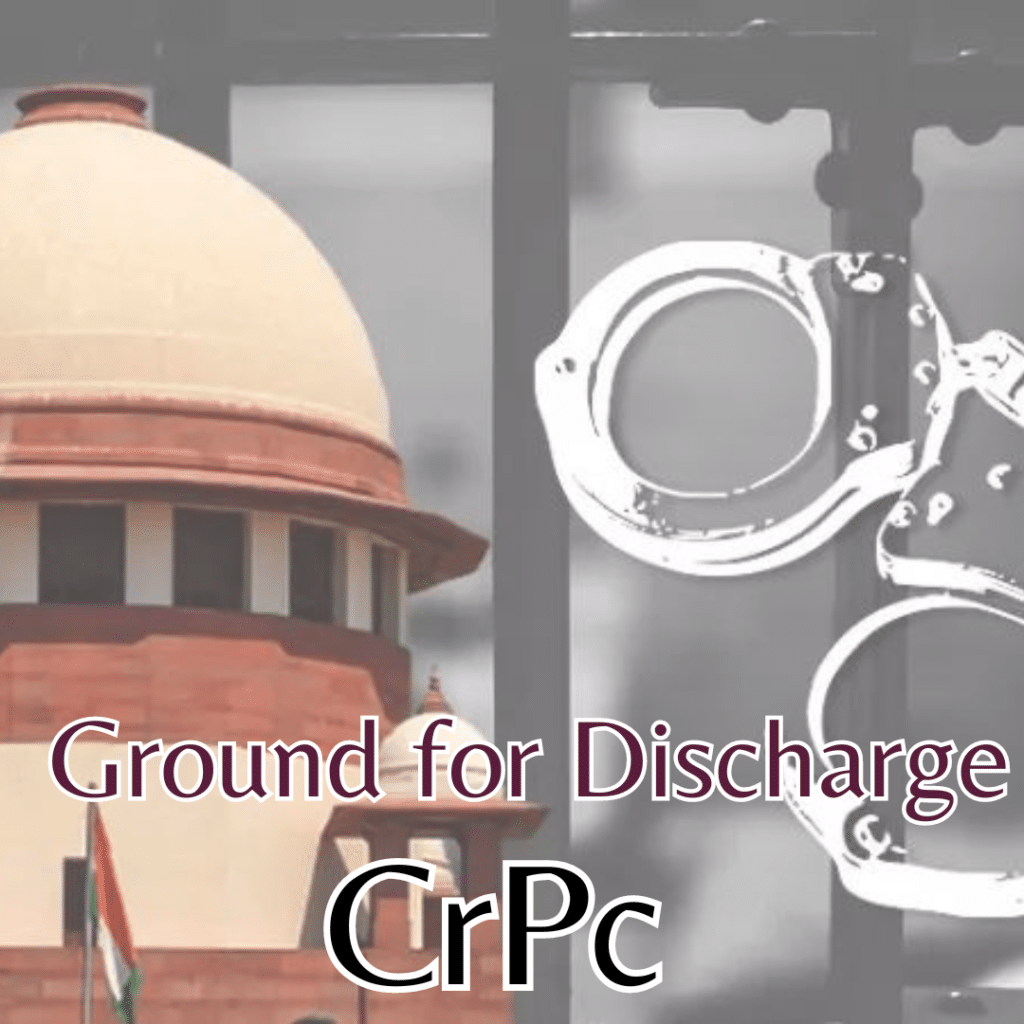
Table of Contents
Ground for Discharge CrPc
Authored By: Harpreet Kaur
Lack of Evidence
One key ground for dismissal is due to a thorough analysis of the available evidence against the accused. Under section 227 of CPC, it is necessary for the court to decide if there is enough evidence on record to make out a case that gives rise to presumption against defendant. H. Whether there is sufficient evidence to justify proceedings. If the court determines That there is insufficient evidence, the defendant can be Released, thereby ensuring that individuals are not brought to trial on weak or insufficient grounds.
Frivolous or malicious prosecution
Section 227 acts as a safeguard against frivolous or malicious prosecution. If the court finds that this action was instituted in bad faith like personal vendetta or unfounded allegations then it has discretion and power under CrPC1898 provision to discharge him by exercising its inherent powers under section 227. In order to guard against abuse of process and maintain integrity in criminal justice system.
Unlawful Investigation: A fair criminal trial requires a thorough and proper investigation. Article 227 empowers a judge with authority to scrutinize investigation quality (Criminal Procedure Code). In case the police inquiry proves defective, insufficient or tends towards casting doubts over reliability of testimonies then such court may dismiss an accused person. This ensures that individuals are not unfairly burdened with the consequences of an incomplete or biased investigation.
No Probability of Conviction
There is no chance of a conviction In addition to the quantity of evidence, the court also has a duty to evaluate its quality. Even where there is evidence, section 227 requires the court to assess whether there is a reasonable possibility of conviction on the basis of that evidence. If the court concludes that such a probability does not exist, the defendant can be released, thereby preventing proceedings that have a very low probability of obtaining a conviction.
Settlement between Parties
Section 239(1)(a) Criminal Procedure Code makes provision for disposal through agreement between respondent and petitioner resulting in charges being dropped off. Where parties can solve it themselves, the court must discharge the accused. This recognizes the importance of alternative dispute resolution, allowing individuals to resolve disputes outside of traditional court procedures.
False Information or Fabricated Evidence
If the court finds that the information or evidence is false or fabricated, it may be grounds for dismissal Article 227 makes provision where courts could dismiss cases based on false or fabricated evidence so as to maintain truthfulness and sincerity in legal proceedings.
Duties of a judge when releasing an accused
When releasing an accused under section 239, the judge must perform the following duties:
- Look into the police report filed under section 173 of CrPC.
- Considerations on Section 173 Charges made in support
- Give full opportunity to prosecution;
- Allow proper trial to accused;
If, after fulfilling the above obligations, the judge determines that the allegations against the defendant are unfounded and vague, he shall release the defendant.
Rumi Dhar vs. State of West Bengal (2009)
In this case, an FIR was registered by the CBI under Sections 120B, 420, 467, 468 and 471 of the Indian Penal Code. Bank employees were also charged under the Prevention of Corruption Act 1988. An agreement was reached between the complainant and the bank. An application was filed under Section 239 of the CrPC for stay of the criminal proceedings. The Supreme Court held that before considering an accused’s application for release under Section 239 of the CrPC, the judge must consider the details of the charges leveled against him.
What is Section 173 document under Section 239 of CrPC?
While releasing an accused under Section 239 of CrPC, the court has to consider the police report and documents filed under Section 173 No.
Under section 173(2)(i), the person in charge of the police station concerned is required to submit a police report to the Magistrate. The police report must be in the format prescribed by the state government and must include the following information:
- Name of complainant and name of defendant.
- names of people believed to be familiar with the circumstances of the incident.
- Whether a crime appears to have been committed, and if so, by whom.
- Whether the defendant was arrested.
- Whether he is released on bail, and if so, with or without surety.
- Whether he was detained under Article 170.
- If the examination relates to an offense under Sections 376, 376A, 376B, 376C, 376D or 376E of the Indian Penal Code, whether the woman is accompanied by a medical examination report.
As per section one hundred seventy-three (5) where such report relates only to occurrence involving offences envisaged by preceding provisions hereof but relating to either sections one hundred five or one-hundred sixty eight it shall contain all statements recorded u/s161 along with necessary extracts from any document senile thereto.
People who give evidence must be sent back to trial courts because they have reported to the judge. The state prosecutor is filing an appeal. As in the case of Raghbir Saran Jain v. State (1995), the police report filed under Section 173(2) did not include required documents under Section 173(5). Thereupon, the magistrate was considered to be unreasonable on that ground. Taking notes on such incomplete report has been cancelled as a result of this order.
Conclusion
The CrPC provides grounds for dismissal so as not to burden individuals with proceedings that do not have legal basis. They are vital to fairness and integrity of criminal justice systems thus enabling courts scrutinize evidence, inquire into cause list and deal with issues such as wrongful prosecution and tampering with evidence. It also helps in promoting delicate balance between individual rights’ protection and pursuit of justice which is vital for strong legal framework.





